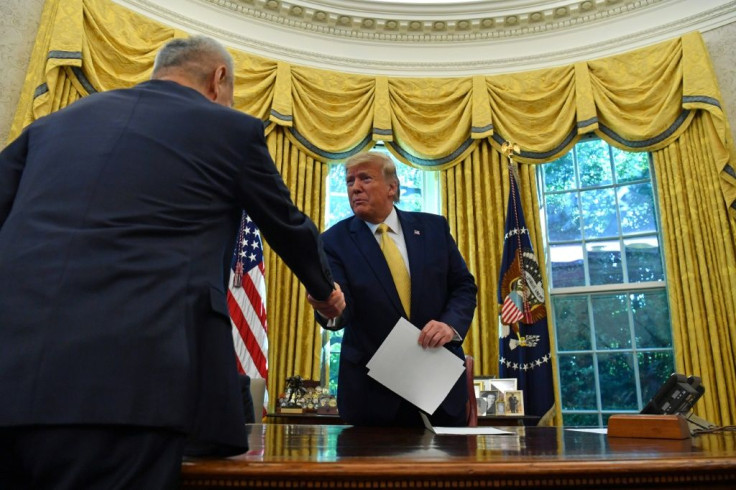Embattled Trump Takes Victory Lap On China Trade Deal

Engulfed in an impeachment inquiry and other political turmoil, US President Donald Trump on Friday trumpeted the success of his hard-line stance with China, claiming to have scored a major win in the grinding trade war between the economic powers.
But while Trump took a victory lap for what he called it a "substantial phase one deal," it will take weeks to finalize and the final details are not clear, nor will it roll back tariffs already in place on hundreds of billions of dollars in two-way trade.
Trump hailed a breakthrough on an initial deal that included a surge in purchases of American farm products and also covers intellectual property, financial services and currencies.
With the deal the White House will hold off on a massive tariff increase planned for next week, and as negotiations progress new tariffs planned for December also could be called off, US officials said.
Trump said China had pledge to rapidly ramp up purchases of American farm products, to $40-50 billion. That would be a stunning feat, more than doubling from the prior level of less than $20 billion in 2017.
Total US agriculture exports were $140 billion in 2018, so that increase would mean a third going to China.
"So I suggest the farmers go immediately by more land and get bigger tractors," Trump told reporters at the White House.
"There was a lot of friction with China. Now it's a love fest," he said at the end of his meeting with Beijing's lead trade envoy, Vice Premier Liu He.
Mixed reaction
After more than a year of trench warfare, however, it remained unclear whether the countries could sustain the momentum needed to conclude subsequent "phases" of the deal.
Trump said it would take up to five weeks to conclude the first phase and get a deal on paper, which would cover some key issues like currency manipulation.
But he said he hoped to sign with Chinese leader Xi Jinping when they are both in Chile for the APEC leaders summit in mid November.
However, some observers said the deal was underwhelming.
Greg Daco of Oxford Economics called it an "itsy-bitsy-teeny-weeny handshake deal."
Though it lays the foundation for a broader accord later, "behind the hype, this is nothing more than partial and ostensibly unsustainable deal lacking in real enforcement mechanisms," he said in an analysis.

"For businesses this will mean less damage, not greater certainty."
The National Retail Federation said it was encouraged by the progress, adding, however: "Although this is a step in the right direction, the uncertainty continues."
Rolling back tariff hikes
But even the incremental win could be a boon for Trump, who faces an impeachment firestorm and a stinging criticism in Congress for his treatment of Kurdish allies in Syria, only the latest episodes in the White House's perpetual turmoil.
Treasury Secretary Steven Mnuchin told reporters Washington will not impose the tariff increase on $250 billion in Chinese goods, which were set to rise to 30 percent from 25 percent on Tuesday next week.
And US Trade Representative Robert Lighthizer said the next round of tariffs due to hit on December 15 could be canceled.
"The president has not made a final decision on that, but there was plenty of time to make that decision. That is certainly part of this process with the Chinese," he said.
He also said the agreement will include new measures on enforcement.
While the details are scant, Mnuchin said the sides made good progress on opening the Chinese economy to financial services, while including an agreement on preventing manipulation of the yuan.
The US Treasury in August branded China a currency manipulator, accusing Beijing of deliberately weakening the yuan to gain unfair trade advantages.
Trump also said the deal would make some steps toward protecting American technology, a major focus of the trade frictions.
Since the China trade war began last year, moments of comity and cheer have more than once been shattered, giving way to jolting deteriorations in relations between the two sides.
China has so far balked at Trump's demands for profound changes in the way Beijing manages its economy, which analysts say could politically undermine the Communist Party.
Liu also praised the accord.
"We very much agreed to get to the China-US economic relationship right. It is something good for China or for the United States and for the whole world," he told reporters at the White House.
"We are making progress towards a positive direction."
© Copyright AFP 2024. All rights reserved.










